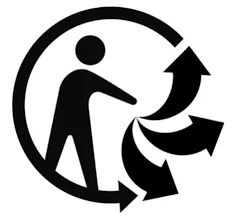
AGEC: a law called into question by the manufacturers
The AGEC law, published on 11th February 2020 in France, began to apply in several aspects as early as January 2021. It is spread over 5 main areas until 2040:
- Getting out of disposable plastic
- Better consumer information
- Fighting against waste and for solidarity-based reemployment
- Acting against programmed obsolescence
- Better production
In order to achieve these objectives, certain actions have already been put in place in France since 1st January 2021. The AGEC law also provided for the creation of a re-employment observatory to assess the relevance of re-employment solutions from an environmental and economic point of view. Unfortunately, the Government has fallen behind schedule and the re-employment observatory has not yet been set up.
Manufacturers have expressed their discontent with certain restrictions such as the obligation to put sorting instructions on the packaging or the mention "not recommended for pregnant women", which can increase the size of packaging. This would run counter to environmental objectives and could even become an obstacle to the free circulation of products, according to some cosmetics professionals. As these obligations are French and not European, they could finally be misinterpreted and products could possibly be refused for export.
Changes to be foreseen in the framework of the anti-waste law
Chapter 1: Waste management and prevention
The measures in the first chapter will have significant impacts on the cosmetics industry, which is obliged to reduce the waste caused by its products. Indeed, the AGEC law foresees the total disappearance of single-use plastic packaging in 2040 with, firstly, the recycling of all plastic packagings by 2025, and secondly, a 15% reduction in household waste produced per inhabitant in France by 2030.
Chapter 2: Consumer information

The packaging of cosmetic products will also have to be modified in line with the new obligations. For example, the environmental characteristics of the products (recycled raw materials, compostability, recyclability, etc.), the Triman logo signage and precise sorting instructions, as well as the "not recommended for pregnant women" logo for products containing proven, presumed or suspected endocrine disruptors, will have to be visible on the packaging.
Also, environmental claims ("Biodegradable", "Environmentally friendly" or any other equivalent statement) will be banned.
Chapter 3: Reuse and reutilisation
Unsold non-food items can no longer be destroyed, but must be either reused or finally recycled. Some products cannot be reused if their minimum durability date is less than 3 months or if there is no possibility of reuse after contacting associations against precariousness for example.
The cosmetics industry is very concerned by this measure: a survey conducted by Ifop in 2019 showed that 3 million French people would deprive themselves of basic hygiene products due to lack of means. The associations would face a frequent shortage of hygiene products such as soap or toothpaste, unsold products that many companies nevertheless throw away.
The AGEC law will encourage the bulk or sale to consumers of products without packaging, in quantities chosen by the consumer, in reusable containers.
Chapter 4: Producer responsibility
Cosmetics producers will also have to change their production methods in accordance with the new obligations:
- An individual or sectoral prevention and ecodesign plan that will have to be updated every five years for packaging waste.
- Obligation to have a recycling channel for plastic packaging.
- Consumers will be able to judge, thanks to an electronic reporting system, excessive packaging that causes these companies penalties.
- An EPR (Extended Producer Responsibility) channel, for the management of final or intermediate waste generated by products, will be created for sanitary textiles. The cosmetics industry is above all concerned by this measure through its pre-soaked make-up removal or even cleaning wipes. A contribution per unit is planned for this type of product.
Chapter 6: Various measures
The french prohibition of mineral oils and derived inks in packaging is one of the main measures in this chapter impacting the cosmetics market. Some of these inks on plastic or cardboard packaging disrupt the recycling process and will therefore be prohibited. Manufacturers will therefore have to find alternatives for the packaging of their products.
Wish to know more about the compliance of cosmetic products ?

For more information, do not hesitate to contact Nataliya Muller or one of our experts!
AGEC: a law called into question by the manufacturers
The AGEC law, published on 11th February 2020 in France, began to apply in several aspects as early as January 2021. It is spread over 5 main areas until 2040:
- Getting out of disposable plastic
- Better consumer information
- Fighting against waste and for solidarity-based reemployment
- Acting against programmed obsolescence
- Better production
In order to achieve these objectives, certain actions have already been put in place in France since 1st January 2021. The AGEC law also provided for the creation of a re-employment observatory to assess the relevance of re-employment solutions from an environmental and economic point of view. Unfortunately, the Government has fallen behind schedule and the re-employment observatory has not yet been set up.
Manufacturers have expressed their discontent with certain restrictions such as the obligation to put sorting instructions on the packaging or the mention "not recommended for pregnant women", which can increase the size of packaging. This would run counter to environmental objectives and could even become an obstacle to the free circulation of products, according to some cosmetics professionals. As these obligations are French and not European, they could finally be misinterpreted and products could possibly be refused for export.
Changes to be foreseen in the framework of the anti-waste law
Chapter 1: Waste management and prevention
The measures in the first chapter will have significant impacts on the cosmetics industry, which is obliged to reduce the waste caused by its products. Indeed, the AGEC law foresees the total disappearance of single-use plastic packaging in 2040 with, firstly, the recycling of all plastic packagings by 2025, and secondly, a 15% reduction in household waste produced per inhabitant in France by 2030.
Chapter 2: Consumer information

The packaging of cosmetic products will also have to be modified in line with the new obligations. For example, the environmental characteristics of the products (recycled raw materials, compostability, recyclability, etc.), the Triman logo signage and precise sorting instructions, as well as the "not recommended for pregnant women" logo for products containing proven, presumed or suspected endocrine disruptors, will have to be visible on the packaging.
Also, environmental claims ("Biodegradable", "Environmentally friendly" or any other equivalent statement) will be banned.
Chapter 3: Reuse and reutilisation
Unsold non-food items can no longer be destroyed, but must be either reused or finally recycled. Some products cannot be reused if their minimum durability date is less than 3 months or if there is no possibility of reuse after contacting associations against precariousness for example.
The cosmetics industry is very concerned by this measure: a survey conducted by Ifop in 2019 showed that 3 million French people would deprive themselves of basic hygiene products due to lack of means. The associations would face a frequent shortage of hygiene products such as soap or toothpaste, unsold products that many companies nevertheless throw away.
The AGEC law will encourage the bulk or sale to consumers of products without packaging, in quantities chosen by the consumer, in reusable containers.
Chapter 4: Producer responsibility
Cosmetics producers will also have to change their production methods in accordance with the new obligations:
- An individual or sectoral prevention and ecodesign plan that will have to be updated every five years for packaging waste.
- Obligation to have a recycling channel for plastic packaging.
- Consumers will be able to judge, thanks to an electronic reporting system, excessive packaging that causes these companies penalties.
- An EPR (Extended Producer Responsibility) channel, for the management of final or intermediate waste generated by products, will be created for sanitary textiles. The cosmetics industry is above all concerned by this measure through its pre-soaked make-up removal or even cleaning wipes. A contribution per unit is planned for this type of product.
Chapter 6: Various measures
The french prohibition of mineral oils and derived inks in packaging is one of the main measures in this chapter impacting the cosmetics market. Some of these inks on plastic or cardboard packaging disrupt the recycling process and will therefore be prohibited. Manufacturers will therefore have to find alternatives for the packaging of their products.
Wish to know more about the compliance of cosmetic products ?

For more information, do not hesitate to contact Nataliya Muller or one of our experts!




.png)


